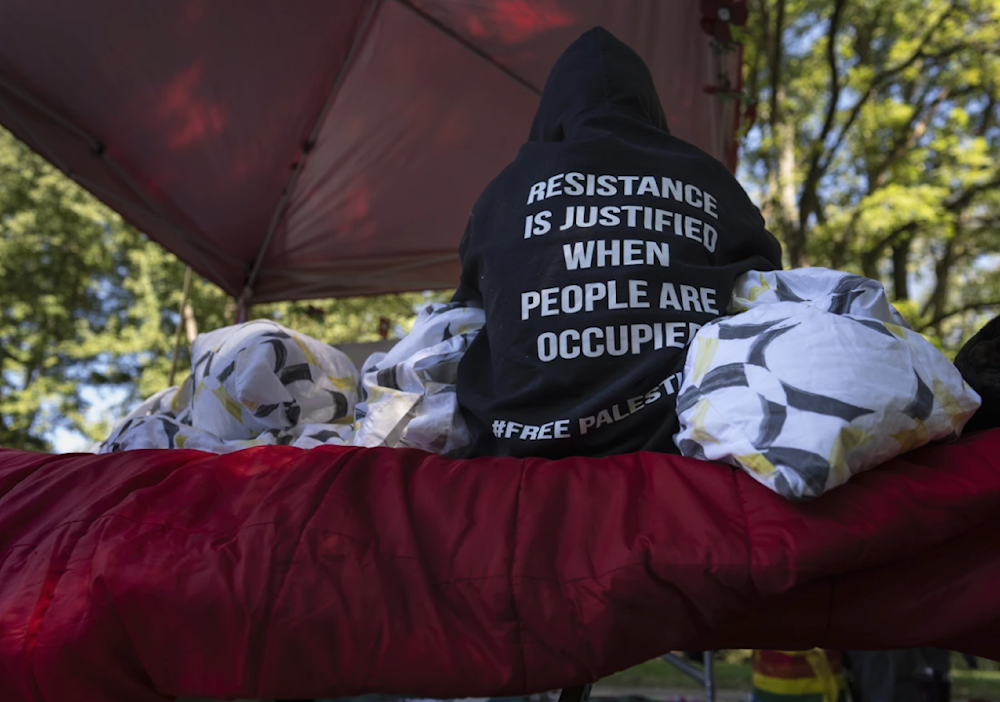NYT slanders pro-Palestine Columbia group for supporting Resistance
Sharon Otterman has selectively reported that pro-Palestine student groups are promoting "violent attacks against Israel," ignoring the historical and political realities that drive such sentiments.
-

A protester sits on a cot on the side of the road near the driveway of Ohio Democratic Rep. Greg Landsman's Cincinnati residence on October 7, 2024. (AP)
The New York Times has accused the pro-Palestine group that initiated the solidarity encampments at the University of Columbia of becoming "more hard-line" in its rhetoric, citing the group's recent celebration of resistance and refusal to “pander to liberal media to make the movement for liberation palatable.”
“We support liberation by any means necessary, including armed resistance,” the group, Columbia University Apartheid Divest, said in its statement.
Sharon Otterman ignores the year of genocide and horrifying aggression against Gaza since last October and dwells on the fact that the group distributed pamphlets on October 7 using Hamas' wording for Operation al-Aqsa Flood.
“One Year Since Al-Aqsa Flood, Revolution Until Victory,” it read, over a photo of Palestinian Resistance members "breaching the security fence to Israel."
After the group used a quote by martyred Hamas politburo leader Ismail Haniyeh and called for a fight for freedom, Otterman wrote in NYT that the group's "increasingly radical statements are being mirrored by pro-Palestinian groups on other college campuses, including in a series of social media posts this week that praised the Oct. 7 attack. "
She alleged that they also reflect the impact of more extremist protest organizations beyond campus, such as Within Our Lifetime, which she claimed promotes violent attacks against "Israel".
Otterman accused Nerdeen Kiswani, the head of Within Our Lifetime, of posting "Long live October 7th" on her X account. However, she overlooks the context: Kiswani was responding to a post that draws a parallel between Jews who revolted against SS members at Auschwitz-Birkenau and Palestinians who rose up against their "Zionist oppressors" on October 7.
In her full post, Kiswani makes a broader comparison between Nazism and Zionism, expressing support for resistance against both, as well as against "all forms of genocide, settler colonialism, and fascism."
October 7th has always been a day against Nazism, and now it’s counterpart Zionism! Long live resistance against Nazism, Zionism, white supremacy, and all forms of genocide, settler colonialism, and fascism! Long live October 7th! https://t.co/LSd9dbki3H
— Nerdeen Kiswani (@NerdeenKiswani) October 8, 2024
However, reporting on these critical details is not advantageous for Otterman, who aims to characterize the movement against Zionist oppression as irrational animosity toward "Israel" and an inclination toward unwarranted violence.
Oren Segal, vice president of the A.D.L. Center on Extremism, told the NYT that over 100 protests tracked featured chants and messages that expressed "support for terrorist organizations."
Otterman claimed the move reflects an internal drive among many pro-Palestine groups to align their objectives with the principles, known as the Thawabet, established by the Palestine Liberation Organization in 1977, which advocate for the right to armed resistance and self-determination from the Jordan River to the Mediterranean Sea.
Otterman attempted to whitewash these rights as outrageous and hate-driven, rather than legitimate actions supported by international law.
Columbia University Apartheid Divest (CUAD) detailed its transformation in a series of Substack posts, explaining how it shifted from viewing itself last semester as part of the Vietnam antiwar movement—focused on urging Columbia to divest from "Israel"—to now openly supporting armed resistance by Resistance groups like Hamas, Hezbollah, and Ansar Allah in Yemen.
This trajectory underscores a blatant double standard in the discourse surrounding violence: while massacres conducted by Israeli occupation forces (IOF) are framed as a right of "self-defense", the struggle for liberation when it involves Palestinians and their allies is labeled as "aggression" and "terrorism".

 3 Min Read
3 Min Read










